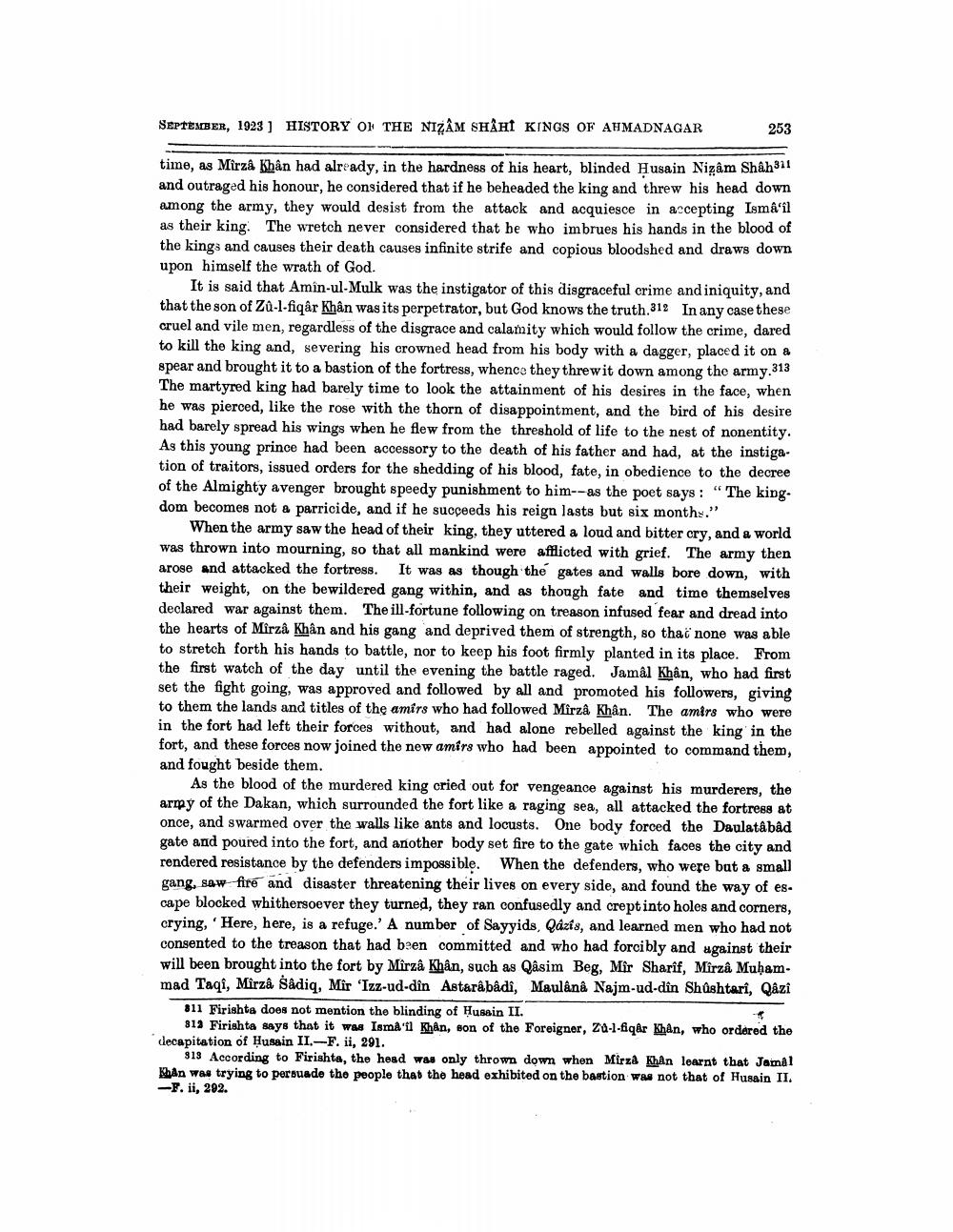________________
SEPTEMBER, 1923 ] HISTORY OF THE NIZAM SHAH KINGS OF AHMADNAGAR
253
time, as Mirza Khân had already, in the hardness of his heart, blinded Husain Nizam Shah311 and outraged his honour, he considered that if he beheaded the king and threw his head down among the army, they would desist from the attack and acquiesce in accepting Ismâ'il as their king. The wretch never considered that he who imbrues his hands in the blood of the kings and causes their death causes infinite strife and copious bloodshed and draws down upon himself the wrath of God.
It is said that Amin-ul-Mulk was the instigator of this disgraceful crime and iniquity, and that the son of Z0-l.fiqar Khân was its perpetrator, but God knows the truth.318 In any case these cruel and vile men, regardless of the disgrace and calamity which would follow the crime, dared to kill the king and, severing his crowned head from his body with a dagger, placed it on & spear and brought it to a bastion of the fortress, whence they threw it down among the army 313 The martyred king had barely time to look the attainment of his desires in the face, when he was pierced, like the rose with the thorn of disappointment, and the bird of his desire had barely spread his wings when he flew from the threshold of life to the nest of nonentity. As this young prince had been accessory to the death of his father and had, at the instigation of traitors, issued orders for the shedding of his blood, fate, in obedience to the decree of the Almighty avenger brought speedy punishment to him--as the poet says: "The king. dom becomes not a parricide, and if he succeeds his reign lasts but six months."
When the army saw the head of their king, they uttered a loud and bitter cry, and a world was thrown into mourning, so that all mankind were afflicted with grief. The army then arose and attacked the fortress. It was as though the gates and walls bore down, with their weight, on the bewildered gang within, and as though fate and time themselves declared war against them. The ill-fortune following on treason infused fear and dread into the hearts of Mirza Khan and his gang and deprived them of strength, so thaï none was able to stretch forth his hands to battle, nor to keep his foot firmly planted in its place. From the first watch of the day until the evening the battle raged. Jamal Khân, who had first set the fight going, was approved and followed by all and promoted his followers, giving to them the lands and titles of the amirs who had followed Mirza Khân. The amirs who were in the fort had left their forces without, and had alone rebelled against the king in the fort, and these forces now joined the new amirs who had been appointed to command them, and fought beside them.
As the blood of the murdered king cried out for vengeance against his murderers, the army of the Dakan, which surrounded the fort like a raging sea, all attacked the fortress at once, and swarmed over the walls like ants and locusts. One body forced the Daulatâbâd gate and poured into the fort, and another body set fire to the gate which faces the city and rendered resistance by the defenders impossible. When the defenders, who were bat a small gang, saw fire and disaster threatening their lives on every side, and found the way of escape blocked whithersoever they turned, they ran confusedly and crept into holes and corners, crying, 'Here, here, is a refuge.' A number of Sayyids, Qazis, and learned men who had not consented to the treason that had been committed and who had forcibly and against their will been brought into the fort by Mirza Khân, such as Qasim Beg, Mir Sharif, Mirza Muhammad Taqi, Mirza Sadiq, Mir 'Izz-ud-din Astarâbâdi, Maulânâ Najm-ud-din Shushtari, Qazi
311 Firishta does not mention the blinding of Husain II.
813 Firishta says that it was Isma'il Khân, son of the Foreigner, Zu-l-fiqar Khan, who ordered the decapitation of Husain II.-F. ii, 291.
918 According to Firishta, the head was only thrown down when Mirza Khan learnt that Jamal Khan was trying to persuade the people that the head exhibited on the bastion was not that of Husain II. -F. ii, 292.




